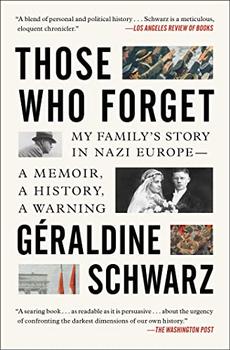Summary | Excerpt | Reading Guide | Reviews | Beyond the Book | Readalikes | Genres & Themes | Author Bio

My Family's Story in Nazi Europe – A Memoir, A History, A Warning
by Géraldine Schwarz
Unlike the Americans, the British were much less interested in denazification based on sanctions in their northwestern zone, which included Hamburg, Lower Saxony, North Rhine–Westphalia, Schleswig-Holstein, and the western sector of Berlin. Above all, they aimed for reeducation through newly created media outlets in the region. Sometimes democratization was imposed with an iron fist, as in the case of a British commander in the small town of Steinfurt, who forced the inhabitants to watch a film made during the liberation about concentration-camp victims. The relationship between the local population and their occupiers was much more distant than in the American zone, and the British were often regarded as a kind of colonial invader, particularly when they commandeered apartments in towns that were already suffering from an acute lack of housing after the bombardments. In truth, the British didn't always have a choice about requisitioning, since they were very much weakened economically by the war and had difficulties financing the costs of the occupation. For the most part, they lived in parallel worlds. The British reserved a certain number of train cars, trolleys, businesses, and cinemas for themselves, with signs posted that read "Keep Out" or "No Germans." They also reproduced their model of clubs, and though they occasionally allowed some Germans entry, this mingling was rare. The British quickly abandoned the idea of decontaminating German society and merely focused on banning former Nazis from applying for the most senior civil service positions and catching the biggest fish. They were so indulgent toward wartime complicity that some Nazis under American occupation hurried to reach their zone.
More than anything, the British were eager to rebuild the economic power of Germany, in which they had their own vested interests. And so they proved to be accommodating if the accused were part of the Reich's economic elite, as was the case with Günther Quandt. He was not a hardline National Socialist, but an opportunist who waited until Adolf Hitler came to power in January 1933 to finance and then join his party. A familial tie reinforced this financial proximity, since the industrialist's second wife, Magda Ritschel, whom he had divorced, had gone on to marry Joseph Goebbels, the future minister of propaganda, in December 1931, with the Führer himself as best man. Despite the fact that he was in conflict with Goebbels over the custody of his son, Quandt's loyalty to Hitler paid off, as he amassed a colossal fortune and became one of the Nazis' largest military suppliers. During the massive labor shortage caused by the mobilization of men to the front, Quandt exploited some 50,000 forced laborers—prisoners of war and detainees in concentration camps, who were "loaned" by the Reich at low cost. In 1946, the Americans arrested Quandt, but he escaped the Nuremberg Trials thanks to the British, who "overlooked" the documents concerning his case and didn't send them to the Americans, then continued the farce by officially classifying him as a Mitläufer. In January 1948, the Americans, for their part, refrained from investigating further and liberated him. Soon after, the British army rushed to do business with this weapons specialist.
Quandt was a rare specimen. He made equipment that the whole world wanted, in particular, the battery for the "magic weapon" the Nazis developed during the war—the V2, the first operational ballistic missile and the precursor of intercontinental missiles and space flight. After the war, the Quandt family, which is now a major shareholder in BMW and other high-profile companies, was steeped in denial about the suspect origins of their fortune until a 2007 television documentary called The Silence of the Quandts forced them to acknowledge their past.
As for the French, whose zone was the smallest—it included only a little strip of land at the French border and the northwest of Berlin—they also quickly realized the advantages of being lenient toward industrialists who, in return for this generosity, offered promising business opportunities. In general, the French acquired a reputation as the occupying force least interested in denazification. They preferred to accuse the Germans as a whole, without differentiating individuals by their degree of culpability or hoping to reeducate them. The feeble number of judicial procedures they undertook was in part due to the fact that France itself, having closely cooperated with the Third Reich, had a postwar administration rife with former Vichy collaborators who feared that accusations against the Nazis would return to haunt them. Among the Allies, General de Gaulle, who governed France after the war, was most in favor of policies that would weaken Germany, hoping for it to be permanently divided and to pay maximum reparations. This stance was apparent in the occupiers' vindictive attitude toward the local population, who feared the French agenda. Though the French were only invited to the victors' table at the last minute because of their collaboration with the Reich, they acted like a true occupying force—confiscating apartments to house their own teachers, engineers, and officials, exploiting German labor, and requisitioning food in abundance, while many Germans were living in basements, hungry and cold, with no fuel to warm themselves. There was even a series of rapes.
Excerpted from Those Who Forget by Géraldine Schwarz. Copyright © 2020 by Géraldine Schwarz. Excerpted by permission of Scribner. All rights reserved. No part of this excerpt may be reproduced or reprinted without permission in writing from the publisher.
Your guide toexceptional books
BookBrowse seeks out and recommends the best in contemporary fiction and nonfiction—books that not only engage and entertain but also deepen our understanding of ourselves and the world around us.